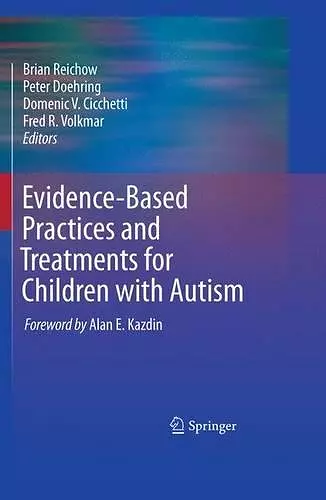Evidence-Based Practices and Treatments for Children with Autism
Fred R Volkmar editor Brian Reichow editor Peter Doehring editor Domenic V Cicchetti editor
Format:Paperback
Publisher:Springer-Verlag New York Inc.
Published:1st Jul '11
Should be back in stock very soon

Autism spectrum disorders (ASDs) have been increasingly diagnosed in recent years and carries with it far reaching social and financial implications. With this in mind, educators, physicians, and parents are searching for the best practices and most effective treatments. But because the symptoms of ASDs span multiple domains (e.g., communication and language, social, behavioral), successfully meeting the needs of a child with autism can be quite challenging.
Evidence-Based Practices and Treatments for Children with Autism offers an insightful and balanced perspective on topics ranging from the historical underpinnings of autism treatment to the use of psychopharmacology and the implementation of evidence-based practices (EBPs). An evaluation methodology is also offered to reduce the risks and inconsistencies associated with the varying definitions of key autism terminology. This commitment to clearly addressing the complex issues associated with ASDs continues throughout the volume and provides opportunities for further research.
Additional issues addressed include:
- Behavioral excesses and deficits treatment
- Communication treatment
- Social awareness and social skills treatment
- Dietary, complementary, and alternative treatments
- Implementation of EBPs in school settings
- Interventions for sensory dysfunction
With its holistic and accessible approach, Evidence-Based Practices and Treatments for Children with Autism is a vital resource for school psychologists and special education professionals as well as allied mental health professionals, including clinical child and developmental psychologists, psychiatrist, pediatricians, primary care and community providers.
From the reviews:
"In summary, “Evidence-based Practices and Treatment for Children with Autism” provides a well-organized, up to date analysis of the major treatment programs with proven efficacy. It links research with clinical practice for children with ASDs, a major public health concern. For that reason, I highly recommend this book. As each of us struggles to find the most effective treatment for this critical population of children, we owe it to ourselves and our patients to understand the basis for and effectiveness of our treatment decisions."
- Cathy Scheiner, MD, Developmental Pediatrics, Children's National Medical Center, Washington, DC
Journal of Developmental & Behavioral Pediatrics, Vol 34., No. 3, April 2013
---
“This book presents various treatments for autistic spectrum disorders which are supported by meta-analytic research. … Graduate students in psychology and social work would benefit as well. … book presents the latest research findings in order to give readers a better understanding of autistic spectrum disorders and treatment options. … It is easy to read and filled with useful information on evidence-based practices, along with hundreds of references to follow up on specific details. This is essential reading for clinicians in the field.”
- Gary B. Kaniuk, Doody’s Review Service, April, 2011
---
"In the words of the classic Wendy’s commercial, it is often very difficult to find “the beef” amid the hype. Evidence-Based Practices and Treatments for Children With Autism, edited by Reichow, Doehring, Cicchetti, and Volkmar, aims to provide this much-needed tempered view of the field. In careful prose, the authors examine the evidence on treatment outcomes for a number of behavior problems of special interest to clinicians working with children with autism, as well as to their families.
As a result of its strong organizational structure, this bookprovides a timely and much-needed addition to the literature. Rather than further obfuscating an already confused field with unsupported pronouncements, it provides a measured, comprehensive, and evaluative review of the research, identifying what we know is effective (e.g., joint attention training and milieu communication training; Prelock, Paul, and Allen, Chapter 5); what appears promising (e.g., cognitive-behavior therapy as a treatment of comorbid anxiety disorders; Wood, Fujii, and Renno, Chapter 7); and what currently has no evidence (e.g., dietary and nutritional supplements, such as gluten-free or casein-free diets; Hyman and Levy, Chapter 10)."
- Jeanne M. Slattery and MollyJill Smrekar, PsycCRITIQUES, October 19, 2011, Vol. 56, Release 42, Article 8
ISBN: 9781441969743
Dimensions: unknown
Weight: unknown
408 pages
2011 ed.